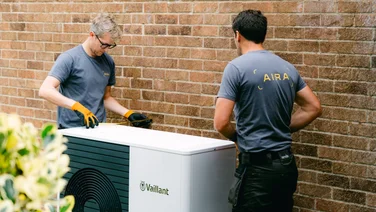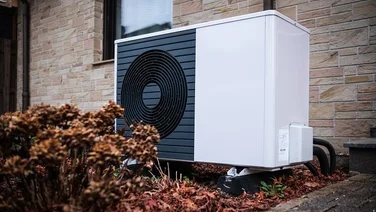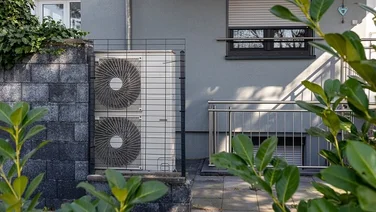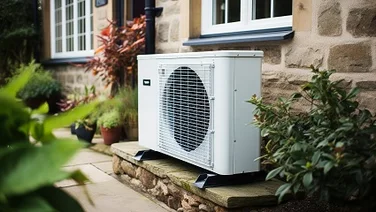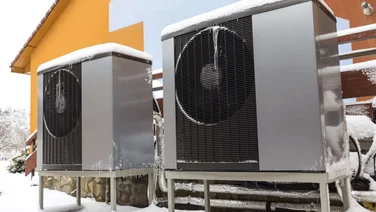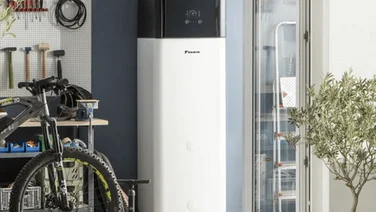We receive a small fee from trusted installers when you request a quote through our site. This helps us keep our content independent, well-researched and up to date – Learn more
- What’s the average lifespan of a heat pump?
- Can a heat pump heat a whole house?
- The 7 biggest heat pump problems
- 1. The heat pump isn’t heating or won’t turn on
- 2. The heat pump is constantly running
- 3. The heat pump isn’t going through its cycles correctly
- 4. The heat pump’s outdoor unit is icing up
- 5. The heat pump has an odd smell
- 6. The heat pump is making strange noises
- 7. The heat pump’s indoor units are leaking (air-to-air heat pumps)
- Summary
- Installing a heat pump is one of the best ways to cut carbon emissions.
- Incredibly efficient, they can continue working for 25 years if properly maintained.
- Most common issues include refrigerant leaks that can cause heat pumps to fail or the outdoor unit icing up.
- The most common issue with heat pumps is relatively easy to identify and correct.

Heat pumps are great at cutting carbon emissions and while they won’t save you money right now, they might well do in the future once the price of electricity comes down. However, like most machines, heat pumps can be prone to problems.
In this article, we’ll discuss the biggest heat pump problems, their potential causes, and the solutions so you can feel confident about owning a heat pump.
Don’t have a heat pump or want to replace one? We can help. Simply fill in our short form, and we’ll pass your details on to our network of heat pump installers. They’ll contact you with their bespoke quotes for you to compare.

What’s the average lifespan of a heat pump?
Heat pumps last 20-25 years on average. That’s around a decade more than gas boilers, which typically last 10-15 years.
The underground components on a ground source heat pump can actually last up to 70 years, although the above ground units need to be changed sooner.
Find out how heat pumps stack up against gas boilers by going to our page, Heat Pumps vs Gas Boilers.
Can a heat pump heat a whole house?
Yes, a heat pump can heat a whole house. Heat pumps are designed to be integrated into your existing heating system of radiators, underfloor heating, or air ducts (if you get an air-to-air heat pump).
This means that they’ll provide heat to every room in the house that has a heat dispenser, such as a radiator, installed.
Why is my electricity bill so high with an air source heat pump?
Air source heat pumps use electricity (which is typically more expensive than gas at the moment) to convert heat from the air into heat for your home, so it’s normal to see an increase in your electricity bills when you switch from gas heating to electric heating.
However, if you notice an unusual spike in your electricity usage, it could indicate that there’s a problem with your heat pump. In this situation, it’s a good idea to get it serviced by a professional so they can tell you what’s wrong and fix it.
The 7 biggest heat pump problems
When heat pumps go wrong, it’s usually because of a few common reasons. Troubleshooting these problems can help you keep bills down and speed up getting the heat pump back up and running.
To this end, we’ve rounded up seven common problems with heat pumps so you can know what to look out for.
The most common heat pump problems are:
- The heat pump isn’t heating or won’t turn on
- The heat pump is constantly running
- The heat pump isn’t going through its cycles correctly
- The heat pump’s outdoor unit is icing up
- The heat pump has an odd smell
- The heat pump is making strange noises
- The heat pump’s indoor units are leaking (air-to-air heat pumps)
We’ll go into more detail about each problem and how to solve it in the sections below.
1. The heat pump isn’t heating or won’t turn on
The first heat pump problem you’ll likely notice if a heat pump isn’t heating your home. But don’t worry, you can check a few simple things to narrow down the issue quickly.
If your unit isn’t turning on, this could mean several things are out of whack – from the thermostat, the radiator valves (or air ducts if you have an air-to-air heat pump), the electricity supply, the refrigerant, or the outdoor unit.
This is what you should look out for:
Malfunctioning thermostat
There could be a problem with the thermostat. The first thing to do is check that the thermostat is set to ‘heat’ and set at the correct temperature.
If the thermostat is set correctly but there’s still no heat, it could be that the thermostat is out of range, that the battery is dead (if it’s battery-operated), or that a circuit breaker on your electrical panel has been tripped. The first step is to replace the batteries and check your circuit breaker.
However, if that still hasn’t solved the issue, the thermostat may be incorrectly calibrated, so you should contact a professional to get it fixed.
Closed radiator valves or blocked air filters
If you have an air or ground-source heat pump, your radiators could be in trouble. Ensure that the control valves (usually on one side of the radiator) are open.
For those who have an air-to-air heat pump, check the air filters in your ducts. Dirty air filters can block hot air from entering the home. You can clean them using the recommended method. Physical blockages inside your home, such as furnishings blocking vents and registers, may also exist.
Loss of electrical supply to the heat pump
If your heat pump isn’t heating, it could be because it’s lost its electricity supply.
First, check that the switch for both your indoor and outdoor unit is set to ‘on.’ If both units are set to ‘on,’ next, check your circuit breaker for a tripped circuit.
If you’ve checked the switches and the circuit breaker, and neither is at fault, there could be a more complicated issue with the electricity supply. At this point, you should call a technician.
Low or leaking refrigerant
Refrigerant is crucial for the heat pump to transfer the heat it gathers from outside into your home.
If your heat pump isn’t heating, it might be because the refrigerant levels are low. This could be because of a leak or another issue. Either way, it’s best to call a technician to fix any potential leaks and replace the refrigerant.
The outdoor unit is blocked
If you have an air source heat pump or air-to-air heat pump and something is blocking the outdoor unit from pulling heat from the outside air, it might not be able to heat your home effectively.
Check your outdoor unit for debris, such as leaves, snow, or ice, and clear them away. Also, ensure no large piece of garden equipment has been placed against it.
If that doesn’t solve the issue, you guessed it, it’s time to call a technician.
What type of central heating do you currently use?
Get started2. The heat pump is constantly running
Heat pumps aren’t typically meant to constantly run to maintain a set temperature. Several issues could be causing this, such as incorrect thermostat settings, a heat pump that’s the wrong size, leaking refrigerant, or temperature extremes.
For reference, heat pumps should cycle two-three times per hour. If they are running continuously or cycling much more frequently, this could be a sign of an issue. Keep an eye out for:
The thermostat is set too high
If the heat pump is working non-stop, it might be because you’ve set your thermostat at too high a temperature, and the heat pump is struggling to keep up. Ideally, the thermostat should be set between 18ºC and 22ºC in the winter.
You’ll save more on your energy bills by keeping your thermostat at these temperatures too, without sacrificing comfort.
Also, if your home doesn’t feel warm enough in this setting, it might be time to get better insulation since a constantly running heat pump will drive up your electricity bills.
The heat pump is the wrong size for your property
Another reason the heat pump might run constantly is because it’s not the right size for your home. Heat pumps with too small a capacity must work overtime to heat a large house.
A qualified heating installer can determine your home’s level of heat loss and suggest options, such as adding a second heat pump or improving insulation.
Generally though, it’s best to check what size heat pump you need before you get one installed (and whether you’ll need more than one to meet your home’s heating needs).
The refrigerant is leaking
Refrigerant is vital in transferring heat from the outside air or ground to inside your home. A leak will reduce the refrigerant level in your heat pump and cause it to work harder to meet the thermostat’s heat setting.
If this is the issue, you must call a technician to fix the leak and replace the refrigerant.
It’s very cold (or hot) outside
Another reason your heat pump might be running constantly is that it’s a particularly cold day, and the heat pump has to work overtime to draw heat from the air or ground.
This is more likely to happen with air-source heat pumps or air-to-air heat pumps since ground-source heat pumps fare better in very cold weather conditions – when the outside air is at 0ºC, the ground is usually at 10ºC.
Below freezing, condensation on your property’s walls in colder temperatures can cause dampness and reduce heat pump performance due to icing up (more on this further down)
Air-to-air heat pumps double up as air conditioning units in the summer, so they might also run constantly during a heatwave as they struggle to cool the home.
Unfortunately, you cannot do much if temperature extremes cause your heat pump to work constantly. You can, however, reduce the risks of this happening by getting the right size heat pump for your home and properly insulating your property.
Find out more about how heat pumps work in cold weather.

3. The heat pump isn’t going through its cycles correctly
If you’ve set your heat pump to heat your home at specific times, and it’s not following this preset cycle, it could be overheating, or there’s a fault with the thermostat. Alternatively, your heat pump problem in this instance could be that it is short cycling.
Here’s what to look out for:
The heat pump is overheating
Should you find that your heat pump overheats, it could stop working and not finish a heating cycle, or not turn on for the next cycle. Heat pumps can overheat if a dirty filter blocks their airflow.
To solve this problem, open the unit and check whether the filter needs cleaning or replacing. You should aim to check the filter at least once a month – more if you have pets or live in a dusty environment.
There’s a fault with the thermostat
As with several heat pump problems, a faulty thermostat might be the main cause. If the thermostat hasn’t been calibrated correctly, it could cause the cycle to end before the desired temperature has been reached.
If that’s the case, you’ll need a technician to recalibrate or replace the thermostat.
4. The heat pump’s outdoor unit is icing up
Heat pumps are designed to work in cold temperatures, and it’s normal for them to get covered by ice or snow in the winter.
However, you will likely have a heat pump problem if ice keeps building up on and inside your heat pump’s outdoor unit, it could indicate something is wrong with the defrost function, the outdoor fan, refrigerant levels, or lack of airflow. Here’s what to look out for:
A broken defrost function
Most heat pumps have a defrost function to prevent their inside from freezing up in the winter. This function is usually automatic, so if the heat pump is freezing, it could indicate a fault.
To get this fixed, you’ll need to contact a technician.
For reference, when the heat pump enters defrost mode, it temporarily reverses its operation and goes through a “cooling cycle.” During this cycle, warm air is forced through the outdoor coil to remove any accumulated frost.
The heat pump will continue to run until the outdoor coil’s temperature reaches 13-14°C.
A problem with the fan in the outdoor unit
The outdoor unit of an air-to-air or air-source heat pump typically has a fan that draws air from outside and converts it into heat for your home.
If this is broken or moving too slowly, the refrigerant will absorb less heat, which means the inside of the unit is more likely to freeze.
Malfunctioning fans need to be fixed by a professional.
The refrigerant is low
Low refrigerant can be the source of many heat pump problems, including preventing the outdoor unit from icing up.
Low refrigerant, like a faulty fan, can prevent the heat pump from generating enough heat to prevent ice from building up inside at below 0 ºC temperatures.
If that’s the case, you should have the refrigerant replaced by a technician. Refrigerants used in heat pumps can be toxic, so it’s best to let a professional replace it.
Something’s blocking the airflow to the unit
If leaves or other debris build up around the heat pump’s outdoor unit, this can block its airflow and cause it to slow down. This, in turn, increases the chance of ice build-up.
Placing objects too close to the front of the heat pump can also restrict airflow, such as piling wood or parking a car right in front of the unit. Luckily, the solution is simple: clear the debris or move the objects blocking the unit.
5. The heat pump has an odd smell
If you notice an odd smell coming from either the inside or outside unit of your heat pump (or from your air ducts if you have an air-to-air heat pump), it could signal the presence of mould, a pest invasion, or faulty electrical wiring.
This is big heat pump problem, and should you notice an odd smell, don’t ignore it – it could suggest an issue that needs to be dealt with swiftly.
Here’s what to look out for:
Mould growing inside the unit
A musty odour or earthy smell from the heat pump’s outdoor unit (or the air ducts if you have an air-to-air heat pump) could indicate mould growth.
Small amounts of mould on the outdoor unit is normal, and you can clean it away yourself with a damp cloth. However, the unit might require professional cleaning, or need to be replaced entirely if it becomes extensive.
Mould in the air ducts of homes with air-to-air heat pumps will need professional attention, as removing it is difficult and it can lead to health problems. This is especially the case if you have young children or immunocompromised individuals at home.
Dead animals inside the outdoor unit
Sadly, small animals might sometimes get into the outdoor unit and die, producing a rotting smell that’ll start coming from the outdoor unit.
If you think this is the case, you can open up the unit and remove the carcass yourself. You can always hire a professional if you’re too squeamish to do this.
Severe electrical issues
You may also notice a smoky or fishy smell coming from any part of your heat pump system; it could mean the motor is overheating or the wires are clogged.
Either way, the best thing to do is turn off the heat pump via its switch on the circuit breaker and call a technician to look inside it. Leaving it running can cause serious damage to the unit and could even cause a fire.
Bacteria build-up
If you notice an odour like a dirty sock coming from your heat pump, it could be due to bacteria build-up in the heat pump’s drain pan. Much like in a household fridge, this common problem can be resolved by scheduling routine maintenance and cleaning to make sure there are no clogs in the drainage system.
6. The heat pump is making strange noises
A heat pump is a machine with moving parts, so noises such as clicks, taps, humming, etc., are perfectly normal. However, some other noises could indicate you have a heat pump problem.
If your heat pump is making strange noises or much more noise than usual, it could mean there’s a loose piece of hardware, the motor has an issue, or the heat pump is working too hard. Here’s what to look out for:
The heat pump is making a rattling or vibrating noise
Is the outdoor heat pump unit making a vibrating noise? This could mean a small piece of hardware is loose inside the unit or that it’s not properly screwed shut.
Firstly, make sure the heat pump unit is screwed tightly shut. If the vibrating continues, something is loose inside, and a technician must fix it.
The heat pump is making a grinding or shrieking sound
If the heat pump makes a loud grinding, squealing, or shrieking sound, the motor or coils inside the unit wear out, or a faulty compressor is under high pressure. Grinding could also indicate dirty components or the need for lubrication.
Under such circumstances, immediately turn off the heat pump via the circuit breaker and call a technician. Motor problems can be dangerous, so it’s best not to take risks.
The heat pump is louder than usual
If the heat pump isn’t making odd noises but is louder than usual, this means it’s working harder than it should be.
This might be down to the weather, but it could also mean you have the wrong size heat pump for your home.
If you think that’s the case, call a professional to have the heat pump and your home assessed (again, just to stress, it’s a good idea to get the right size heat pump before you get it installed).
Hissing or gurgling noises
Gurgles indicate low refrigerant levels, which can severely affect performance. Hissing typically indicates a large refrigerant leak and that the system will likely stop functioning soon. In either case, the heat pump will require urgent attention from a technician.
Humming or buzzing sounds
If the system isn’t running and makes humming or buzzing noises, this could indicate a stuck relay or contact, faulty capacitor, or motor issues. You should contact a technician.
7. The heat pump’s indoor units are leaking (air-to-air heat pumps)
The final big heat pump problem you need to look out for is a serious one.
It’s normal for the outdoor unit of a heat pump to appear to leak slightly. This is caused by condensation building up inside the unit and dripping.
However, if you have an air-to-air heat pump and notice a leak from an indoor unit or pipe, this could indicate a problem with the refrigerant or a clogged drain line.
Low or leaking refrigerant
Low or leaking refrigerant can cause ice to build up deep inside an air-to-air heat pump’s system. When the ice melts, it’ll cause a leak.
If you notice this happening, get the heat pump checked by a professional.
A clogged drain line
Air-to-air heat pumps have drain lines specifically designed to evacuate water caused by condensation. If the drain gets clogged by debris, water can build up and start leaking into other parts of the system.
You can try to unclog the drain yourself, but it’s safer to have a technician examine the unit and save you from this particular heat pump problem.
Summary
- Heat pumps are great pieces of equipment, and using one to heat your home instead of a gas boiler will lower your carbon footprint.
- However, we’d be lying if we said they had no faults; problems can occur with any machinery, including heat pumps.
- Luckily, you’ve read this article, so you know what to do if you have a heat pump problem.
- If you don’t yet have a heat pump and would like to get one, we can help. Just fill in our short form with a few details, and we’ll pass them on to professional heat pump installers. They’ll be in touch with quotes.


